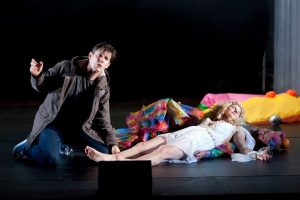SHAKESPEARE’S TOTAL SLAUGHTER
 It’s a daunting statistic: In the 37 plays written by William Shakespeare, there are 74 onstage deaths. (The demises of Ophelia, Cordelia and Lady Macbeth, among others, don’t count because they occur between scenes.) That comes to two partings per play, though most of the comedies keep everyone alive until the end. Actually, there are 75 ends if you count the “black ill-favored” fly killed in Titus Andronicus.
It’s a daunting statistic: In the 37 plays written by William Shakespeare, there are 74 onstage deaths. (The demises of Ophelia, Cordelia and Lady Macbeth, among others, don’t count because they occur between scenes.) That comes to two partings per play, though most of the comedies keep everyone alive until the end. Actually, there are 75 ends if you count the “black ill-favored” fly killed in Titus Andronicus.
Even more actually, the slow demise of that piteous fly, heralded at the start and seen at the end, furnishes the most poignant passing in The Complete Deaths, a two-hour dance of death. The human losses are, well, more stylized. Now at Navy Pier, this two-act travesty is the alternately cunning and crude creation of Spymonkey, an 18-year-old U.K. comedy troupe who combine the freewheeling bad taste of Benny Hill with the flippant spoofery of G&S and Monty Python.
 Tasting your mortality was never such fun, especially when it’s other people’s.
Tasting your mortality was never such fun, especially when it’s other people’s.
Spymonkey appropriately concludes Chicago Shakespeare Theater’s commemoration of the 400th anniversary of Shakespeare’s death. That occasion justifies looking at the Bard’s other deaths, the ones on stage. Not arranged, as you might surmise, by comedies, histories or tragedies, by gender, or in order of seriousness, these 75 extinctions are, like The Complete Works of William Shakespeare (Abridged), a zany tour-de-force teeming with bravura eradications. They’re counted down by an onstage enumerator operated by a very bored lady playing solitaire. A blaring gameshow buzzer signals each life lost. (By intermission there are still 23 deaths to go.) Anyway, “the valiant only taste of death but once.”
So the Grim Reaper gets his signature show. Employing witty projections, rapid costume changes, and closed-circuit cameras zooming in for closeups on hilarious props (more than one fly in fact), our motley quartet indulge in a very “meta” depiction of death refusing to take a holiday. Cocking a snoot at solemnity (though the Bard’s beautiful dirge from Cymbeline gets a gorgeous musical treatment), the  ferocious four “off” both obscure soldiers and the likes of leads. Throughout they display democratic devastation: “Like flies to the wanton gods are we / They kill us for their sport.” As Spymonkey’s gross-out temperaments dictate, they are not above nudity, overdressing, or the employment of action codpieces.
ferocious four “off” both obscure soldiers and the likes of leads. Throughout they display democratic devastation: “Like flies to the wanton gods are we / They kill us for their sport.” As Spymonkey’s gross-out temperaments dictate, they are not above nudity, overdressing, or the employment of action codpieces.
Lucy Bradbridge’s abattoir-like design pays homage to Dexter with its dangling plastic sheets. It’s the right antiseptic backdrop for “happy dispatches” that range from the fifth-act carnage in Hamlet to the protracted 110-line conclusion of Mark Antony to the perfunctory slaughter of nameless supernumeraries. We get a Sweeney Todd-style cooking class in how to turn friends into pies (from Shakespeare’s goriest history play Titus Andronicus): Victims go into the grinder head down and come out plump and savory sausages: The drowning of Clarence in a butt of Malmsey is symbolized by a miniature immersion in a glass of water; likewise, the pathetic finale of Cinna the Poet, a sad case of mistaken identity in Julius Caesar, is a clay figure’s nightmare come to death, a cudgeling that ain’t cute.
Petra Massey’s fan-dancing Cleopatra not only gets “immortal longings” but a backup chorus of dancing asps. A Kabuki-style series of ritualized deaths use real blood bags to splatter their way into our hearts. Cumbersomely clumsy, Massey and Altor Basauri turn Romeo and Juliet’s dual departure into a very icky demonstration of clumsy gymnastics in terrible tandem. The Bard’s own spoof of Romeo and Juliet–the deaths of bagpiper Pyramus and Thisbe–require comic overdoses that killed vaudeville. A supposed audience member is recruited to help Brutus and Cassius commit suicide; he takes to it all too easily.
Along the hit-and-miss way, Spymonkey come apart at their seams. Stephan Kreiss develops an addictive and unprofessional ardor for Petra, dropping character to activate his libido. The ghost of Shakespeare appears on screen to order Altor Basauri to abandon this silliness and become a professional thespian (as in the Royal Shakespeare Company), emoting histrionically and working the crowd. Raging against 16th century misogyny, Petra grows furious that she’s not allowed to do Ophelia.
Finally, Basauri, Kreiss and Massey turn on troupe leader Toby Park: They demand that Spymonkey lighten up this dark spectacle. He staunchly resists their desperate attempts at levity. Furious at Park’s contempt for their kitsch (reviling it as “the narcotic of cheap laughter” and “hollow buffoonery”), the monkeys fire him and indulge in some unadulterated crowd-pleasing’”slides of cute animals playing with flowers, inflated clown costumes, soap bubble and smoke pageantry, and a giant plastic balloon to signify Ophelia’s watery grave. Alas, it’s just another death trap. After a sweet reconciliation, the foursome, playing instruments, regale us with a poignant New Orleans-style jazz funeral’”and the fly from Titus Andronicus meets his strangely affecting final destination.
Wickedly staged by adaptor Tim Crouch, co-produced by the Brighton Festival and Royal & Derngate Northampton, developed at The Other Place at the Royal Shakespeare Company, and presented by Chicago Shakespeare Theater, Spymonkey’s “tale of sound and fury signifying nothing” is a feast of folly with at least a laugh per death’”74 or more. But who’s counting? To paraphrase the Bard, nothing becomes this show like the leaving of it.
The Complete Deaths
Spymonkey
co-produced with Brighton Festival +
Royal & Derngate Northampton
Upstairs at Chicago Shakespeare Theater
800 E. Grand Avenue on Navy Pier
ends on December 11, 2016
for tickets, call 312.595.5600
or visit Chicago Shakes
for more shows, visit Theatre in Chicago






